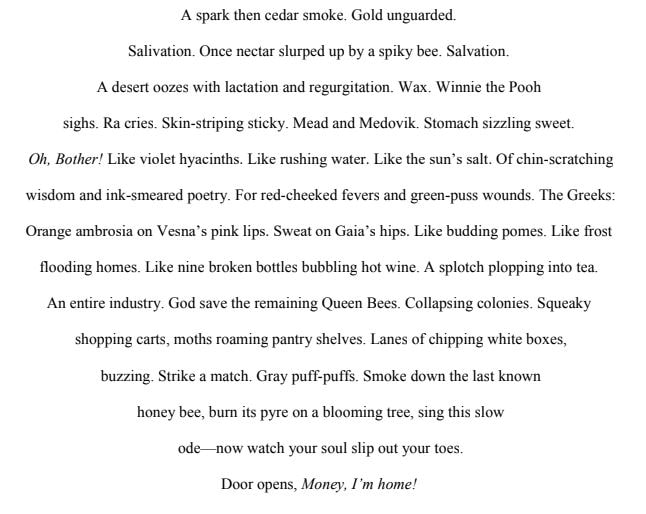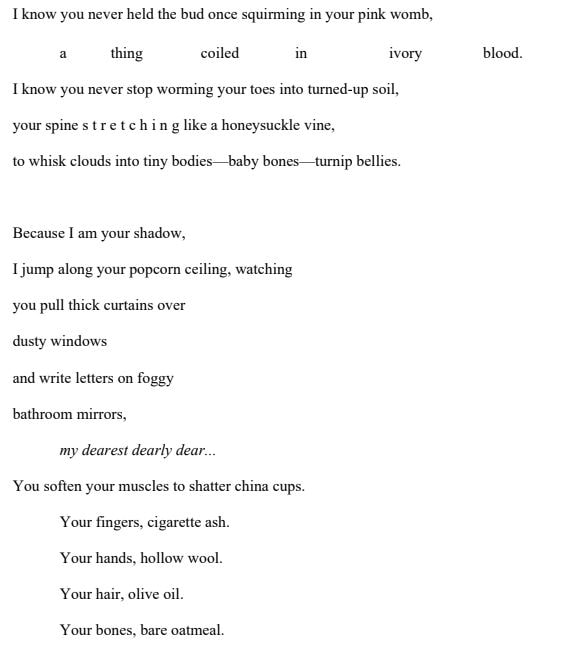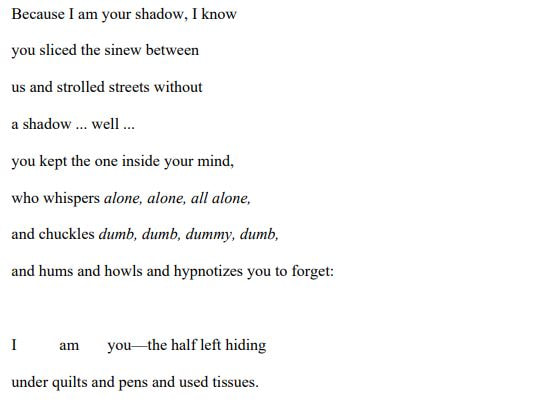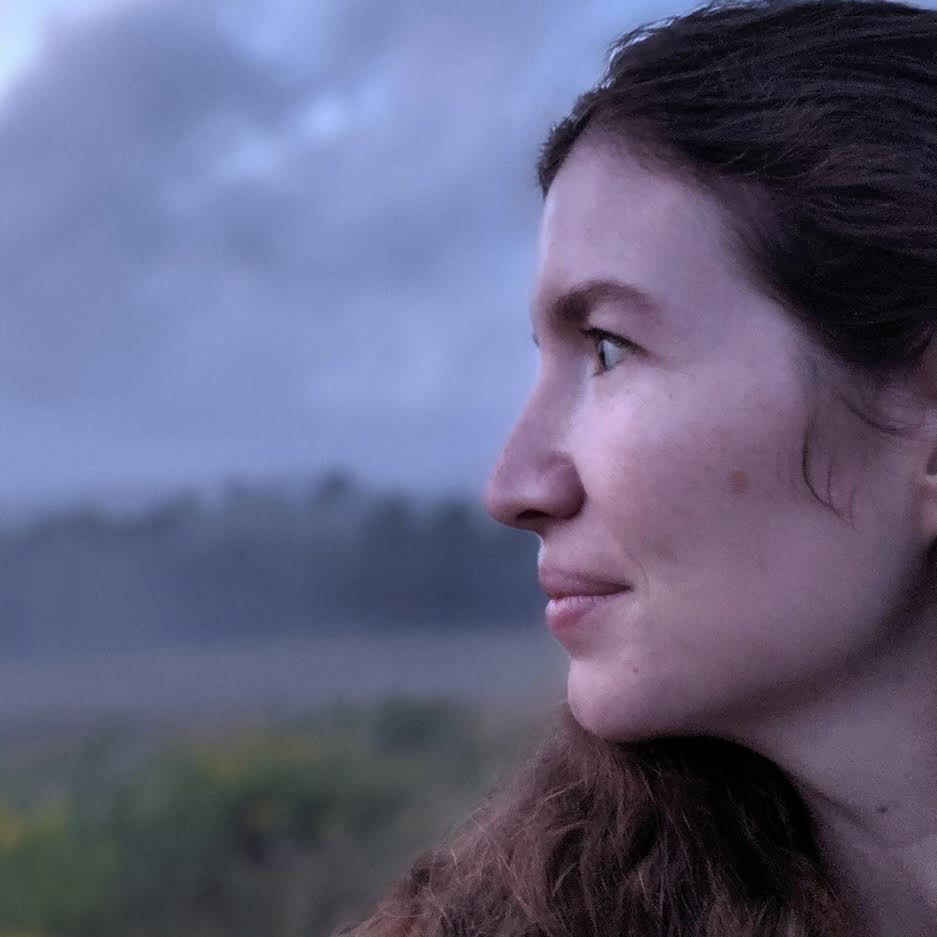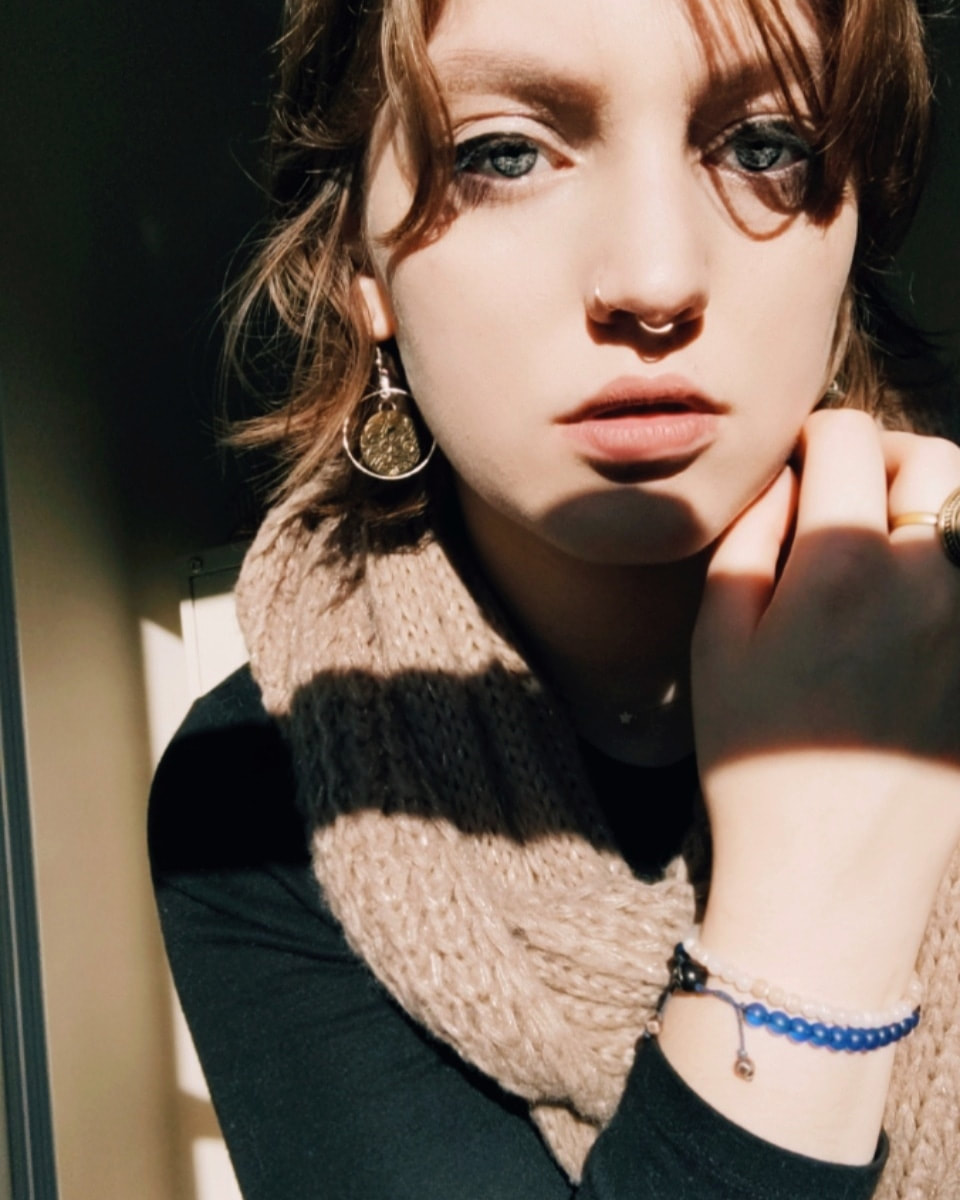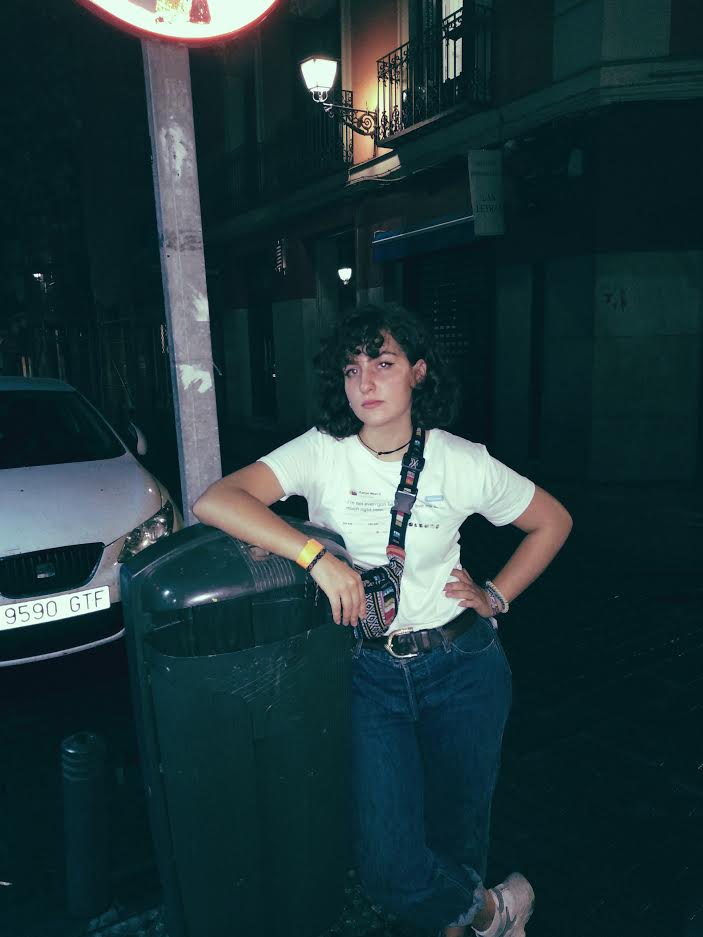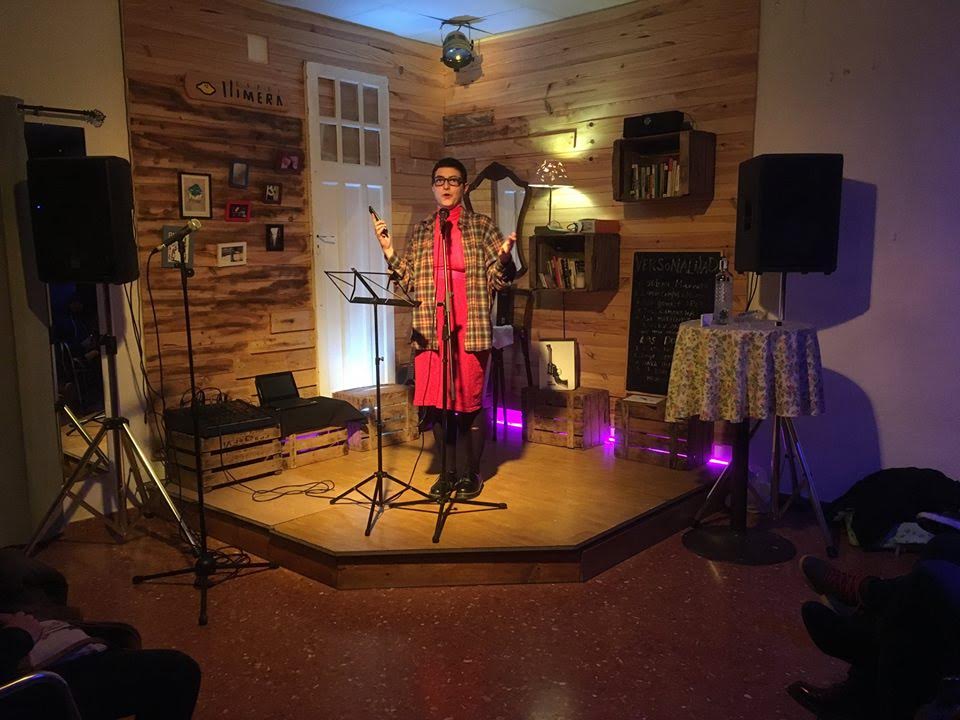A Short History of Honeyfor Dorianne Laux Because I am Your Shadowfor the women surviving womanhood Alina Melnikis a senior in Central Washington University’s Creative and Professional Writing Bachelor’s program. She enjoys experimenting with poetry and fiction. Her work draws inspiration from nature and women’s issues. She tutors on the side and loves windy days. Apparitionthere’s an angel, but with a sword he’s talking about the weather, how crazy kids are these days, but we’re not so crazy after all, he’s still standing there, in your doorway, rambling, even more so for a dead man or a spirit, i’m only awake because i was too afraid to drink water too afraid not to hold your hands in prayer while i slept, even the dead take up space, and too much of our time, who really knows what ghosts sound like? or, if they’re ghosts at all? was it real? i don’t have enough days to answer. A Wand with Your Namewhat is something sweet? sweetheart, tell me a life story – something overkill, like pulpy flowers, over pollinated, sagging petals, almost too tired to be used, something honorable but almost forgotten. Comebacksmy dead boyfriend stills follow me on instagram, what did you ever do? * we’re coping. are you? * gemini connects in venus, your stars are tainted. * you are a broken piece of glass: useless. Stephanie Athena Valentelives in Brooklyn, NY. Her published works include Hotel Ghost, waiting for the end of the world, and Little Fang (Bottlecap Press, 2015-2019). She has work included in Reality Hands, TL;DR, and Cosmonauts Avenue. She is the associate editor at Yes, Poetry. Sometimes, she feels human. three poems: softly the light / in this space between / i have not asked for silence by Rae Rozman12/28/2019
Softly the light unveils a room gasping for breath quiet woman gentle in her melancholy shivers against formless desire Inhale Hold Hold Hold Exhale into emptiness dreams awake and unbending Tulips bloom in a vase on the mantle. What we kill is beautiful. In this space between morning and day between darkness and the dawning of a coral sunrise, the need for you overtakes effortlessness. I am weightless here among the clouds, formless above borders and limitations of time and space. Where I am, when I am: it doesn’t matter. This path leads only to you. I have not asked for silence but you give it freely Is this how the flowers feel when the monarchs migrate? Do they miss the sound of wings? Rae Rozmanis a middle school counselor in Austin, Texas. Her poetry often explores themes of queer love (romantic and platonic), brain injury, and education. You can find her work in the Stonewall’s Legacy poetry anthology, Nixes Mate Review, MockingHeart Review and Trouble Among the Stars (she favors small, quirky literary magazines). An INFJ, Rae can often be found curled up with a novel to discuss with her students, or watching science fiction shows with her partner and their two rescue bunnies. You can find her on Instagram @mistress_of_mnemosyne where she talks about books, shares poems, and posts entirely too many pictures of her bunnies. Woman or MountainI saw her grow ripping the earth wounding the height in a wave, solid and full. I saw her rise from her own insides full of soil and blood, of a treasure nobody ever chased. She rose and I saw her, in my eyes, her roar. The open throat the life at her feet. The flowers drinking her. AnimalI take the human out of me now that the lights have vanished. It’s like they knew. Sharp ends stroke the air in a scale of greys and reds. The night outside like carbon paper unfolding the old beast, chewing glass and spiting smoke, a solid chain of hours, a parade I get to see. Foam staining the carpet, a silent ocean starts to move, bringing a pink nightmare I try to reach with both hands. A simple animal need. I whisper something and something whispers back. The ceiling watches, a white serpent raining on me, mending me. My eyes roll back and dance. The night shakes. My vision has gone blurred and it softens the shapes; they become part of me. I was something now I’m not. My nature lays spread open. A simple animal need.
The following poems refer to my life as a dancer. Martha Graham’s masterpiece, PRIMITIVE MYSTERIES, a dance in three sections, was the first piece I performed of Graham’s in 1964 which was a revival. The work debuted in 1931 and is based on an all female, Native American interpretation of the Crucifixion seen through the Virgin Mary’s eyes. This was the dance that placed Martha Graham on the innovator’s map with Pablo Picasso, Igor Stravinsky and Frank Lloyd Wright. PRIMITIVE MYSTERIES, I – HYMN TO THE VIRGINHELLO step-heel-toe, snap-other-foot-to-ankle in Martha Graham’s Primitive Mysteries, this solemn, ritual walk, its heel-pounding sound bracketing the entrances and exits in this three-part masterpiece. HELLO first section titled Hymn to the Virgin where we, the chorus, frame the Virgin Mary in primitive, stick figure friezes. Four of us hold Her as She splays against our string-taut bodies. Another four cradle-rock their arms to herald the Holy One within. HELLO to each frieze that effects a collective love song. THANK YOU Martha Graham onstage in twelve devotees following her like we follow the Virgin, circling our Mary in countless repetitions of step, step, turn, step, step, add a hiccup jump, accelerating to breakneck speed. Inside this rumpus Mary squats to birth the little one, her pose mirroring da Vinci’s Pieta. THANK YOU Mary who, in a billowing white gown, floats between an aisle of four kneeling dancers on either side. Our hands in prayer, She exchanges blessings with each acolyte in an arm reach soft as baby’s breath. THANK YOU Yuriko who plays Mary. When she blesses me, the last girl, our eyes embrace linking our souls; we are one. GOODBYE to dancers who starve to look like a long drink of water. We’re not the wide-hipped women on whom Martha created this dance in 1931 after she came back from the Southwest where she traveled with composer Louis Horst, to study movement and sound in Native American tribes on Guggenheim grants. GOODBYE months of work to bring life to this 1964 revival, months of prayer at the Temple of Ritual Walk to give step-heel-toe snap-other-foot-to-ankle more weight. GOODBYE to Martha’s hatred of revivals. Quoting Negro League pitcher, Satchel Paige, she’d declare, Never look back, they may be gaining on you. GOODBYE to dreams where I’m performing, wake drenched in anxiety, What’s next? GOODBYE to being drawn to the impossible; how desperate we are for the petroglyphic style to become skin; one girl snaps her meniscus. GOODBYE and THANK YOU for our after-performance satisfaction, a foot-stamping, standing ovation. PRIMITIVE MYSTERIES, II - CRUCIFIXUSHow the movement in Crucifixus purposefully imprisons our bodies. How we ten acolytes, in two groups of three and one of four dancers, trudge shoulder to shoulder along the floor as one grieving body. How our elbows touch each other in a V-shape, which Martha adds because we need to look more constrained. How my C-curved, hunched spine is nailed to its own cross. How I fear this is beyond what I can do. How during one rehearsal Martha shares, Christ asphyxiated on the cross, then later mutters, This is the cruelest dance I ever made. How Louis Horst’s mournful oboe score underlines human suffering. And how center stage, Mary inches forward, Her face a Noh mask, Her cupped hands below Her eyes to catch invisible tears. And how on either side of this tormented Mother, two dancers point to an imaginary cross; Look, look! their pointers seem to say but Her inward gaze remains. How Mary breaks through them, Her arms a cross piece, My son is dead. How we ten women circle our lost Mary in a marathon of fifty-eight leaps before we and the music stop, walk off stage in our solemn step-heel-toe, snap-other-foot to ankle while the audience has yet to breathe. PRIMITIVE MYSTERIES, III – HOSANNAAs if we corps of twelve women could not bear it any longer yet came back for more as if those blood-letting hours to get the Hosannas right-- leg raised, arms splayed as the cross piece simulating some barbaric rite to celebrate the rise of Mary’s dead son-- as our limbs break through to announce His resurrection, a brutal dance wrapped in arms in a cross, jumpjump over and over to convey a brimming joy in the Hosanna phrases while center stage Mary places her hand over an acolyte’s for support through her loss. At one point the dancer back bends into a hungry Mary’s arms as if She were laying to rest Her boy’s body, a goodbye for the many last times. We, the chorus, are the outside world immersed in His return while Mary transitions from pain to acceptance in Hosanna’s last Shiva-like image. With a dancer hidden behind the Virgin, we see four arms rising towards heaven to mark Her Son’s journey and release the sorrow within. We all breathe into this silent language of the soul and rise out of ourselves.
First GradeIn first grade I wore denim shorts to school every single day, even in the winter. I was trying to prove something. My parents were divorcing, and I wanted to be tough. So I wore my long denim shorts, hand-me-downs from my older brother, and I wore my black Raiders jersey and a backwards baseball cap. It was a costume that lasted a long while, a uniform that meant I wouldn’t cry or talk about my feelings. And after a while of not talking about them my feelings went away, like gods without any worshipers. Weather GirlIn high school my plan was to be a weather girl. I was pretty enough for it, or at least my friends said so. Weather girls seemed polished and glamorous on television, and they all spoke with such confidence about this storm or that stretch of sunshine. Maybe wanting to be a weather girl was less about the weather and more about wanting to know something, anything. Wanting to look up at the sky and understand.
After the Full Moon, an Egg Cracked OpenAlone on the boat deck I read the falcon cannot hear the falconer. The sound of water lapping against the boat, the sound of memory erasing itself. Below deck my mother cooked bacon, my brother sung a 50-cent song to himself. My father was silent, the dog snuggled in his lap, a whimper away from sleep. Men in white t-shirts approach us on a zodiac. There were no falcons. Italics From The Second Coming by W.B. Yeats. Self Half SeenThere is a way to be alone, that used to be a part of me. I was made of solitude, mangos, and wind through the hole in the eaves. I never meant to meet my lover. The person I was before, wild only in her late night sleeplessness and coffee drinking ways. That first winter was so cold, everything we had thought about ourselves was irrelevant to who we were becoming. Between the Laundromat and the Nail SalonThe stranger digs her elbow into my back. I am in pain and paying for it, the shoulder muscles click and pop. Unbalanced, she says, the Russian of her accent, rich. As a child I imagined massages to be pleasurable, the kind of luxury my mother would never reward herself with. I only pay for one when migraines make me retch, my shoulders roped together by invisible strings, knotted like an abandoned necklace, my old landlord managed to untangle while talking about advanced mathematics. My husband tries to loosen the tightness sometimes but he’s too attentive to my pain to make headway. I let myself gasp with him. With the stranger my lips are sealed, my fingernails digging into my palm sometimes, invisible under the blanket. A way to redirect focus. The pain I give myself, always the most manageable. When I first figured that out at nine, I bit a canker sore into the side of my own mouth.
by a threadI go where I exist, to the dim sunken corner, your leg wedged between my two legs, single curtain to shut out the unwanted, lyrics white on black above the bed, and I don't think about the creepy man from the sandwich shop who likes how pudgy I am, and I don't think about the lamppost that flew through your window during the hurricane, and I only think off and on about our sicknesses, and I don't think about the sad words on the walls or that night the ambulance came or how I am always crawling into your lap in inappropriate places. It is four thirty in the afternoon, and I am late for living up to my last name. I have left the house to work out its own feelings, all terrible ones like anger and jealousy and disgust, and could it be that a nap with you will solve this monumental problem, thinks the busted adolescent brain. But I am so tired, and you are so, so tired that when my sister asks what's fun about going over to a friend's house just to sleep, I default to my classic response to questions from healthy people and stare at her in silence, hate pooling in my eyes. The world asks too much to demand I explain sadness too. hello doctor, my old friend I follow your legs up the stairs and talk to them about my feelings; this is always what I'm doing. They are flawless and hairless, and I can't stop staring. They seem to fall out of your black skirt announcing you – here I am, your savior, at least the one you hired this week. They keep interrupting my stories with questions about why I love them. And I tell them, I don’t know; why does anyone love anything? Maybe when they catch the light, they look like me, my legs, if I was living another life, your life, where I could be happy, no doubt, and not fall asleep tucked in question marks. Even though you are a presentation, never mind seeing beneath the surface. Not now. Playing dress-up is only the beginning of growing up, of the transformation. Can I imagine such a world, where eyes find themselves at my hemline and envy fogs away the self? love notes to self, despairing - VIIhi baby can you keep your eyes open you set your phone's alarm for half an hour later curl on the couch hold it in your hands pressed against your chest like a stuffed animal that sings and purrs out of nowhere and makes your ❤ pound so hard (and you can't remember if having a ❤ was like this before if this is just what a normal ❤ feels like) sweet❤ she has to cancel you say no problem fine whatever I'll therapist myself? surely I've clocked enough hours to get the job done check your phone and it (you) says calm down your life is not ruined calm down calm down calm down life is always a mess and loud and you can be such a good little self-soother when you bother to try right baby you slam your fist against anything not working keep hitting hard and the more you hit things the more you want to hit things things that would shatter things that would say stop you're ridiculous and well I'm a little worried about your ❤ with this have you been trying to-- hi baby you're not listening to a word I say are you Lauren Benderlives in Burlington, VT. Her work has appeared in IDK Magazine, The Collapsar, Gyroscope Review, Pittsburgh Poetry Review, Yes Poetry, and others. You can find her on twitter @benderpoet. Hand Over HeartWhen I wake I am flat on my back. Paddle my legs to get up. Black hairs all through the bed. To tell the truth, some little stains. I am so ashamed. I rake up the linen, ball it in the corner of the room. I hide under the bed then I am hungry. Breakfast. I must have it. A boiled egg explodes hot in my mouth like a bladder. My tongue is burnt. Rubbery stump. I try not to show it. Ashamed. Today, no one wants to touch me. Black hair on the back of my neck. I meant to take a shower. The train is exciting when it arrives. Inside, I am sleepy. I lean against a woman, carefully. When she gets up she pushes off from me with a hard swing of her hipbone, nudge to say, Back in your place. Someone else sits down. Doggedly, I follow my nose to my classroom. I put my hand over my heart when I feel love. I kiss my students ecstatically as they come in. I try to calm down. I pretend to fall over. Let’s go out to the field and play. I can’t help myself in the game. A frenzy comes upon me. When I am finished with the ball I have ruined it. The children stand in little packs snuffling. In recess they tell their secrets to the door-ajar teacher. She reports to the top. Escalated to formal complaint. Ashamed. I find a can of tuna in the staff room cupboard. I have always hated olives. The children are sleepy in the classroom. I know every face and name. I take them to the pool. We hold our hands over our hearts, and howl. Tune-free. We feel our pulses. We hunt for bugs. Those who don’t have their bathers are allowed to swim naked. Then everyone wants to. Everyone does. The pepper tree is dropping spicy leaves, peppering the deep end with shade. Where the light bites the shadows, the dragonflies skate. I am hungry. I herd the children back in to their clothes before the bell. There is a pool of water underneath me on the train. The wrong kind of clean. I shake. People move away. Cold breath of the freezer strays the hairs on my neck. Ashamed. Sleep. Eat. The TV. At night someone lies next to me. Smells spayed. I feel fixed. You can hardly hear her breathing: how she shows me she’s awake. She holds my hand and puts her face to my face. I have never been so happy. Then the midnight crack of the gate. I make a formal complaint. Hungry. Chocolate I hid away. She comes out crumpled. I am on my haunches, wrapper wagging on my tongue. Her seeing eye fixed on mine. Ashamed. For the first time, I have the thought: I can’t die today. The FrogfishSo I said, That was the very best, sweet- heart, that I have ever had. It wasn’t the last time, but close to it. Should have been closer. Mine was a complex lie, designed to hurt in the short term, me, soothe you, but ultimately get me back the stage. Me, the liar, me the self-abaser, me the praiser, me the bottom feeder, grouper and star- gazer, lying low with my legs and my mouth splayed, waiting for you to fuck up again. You replied—with something I won’t repeat. Not that it was so painful. You were as cruel as you could be but by then you had slipped me so many cruelties that I had grown huge, hairy and insatiable, a frogfish. My hidden lips sucked up punishments twice my size, and I begged for more, just to see what you in your disgust could say. I never moved from my deep place underfoot—biologists call it both bed and floor, and both were mine—I took and took, but even the frogfish may betray a gleam in her golf-ball eyes. I had the look a misplaced home surveillance system blinking with an urgency dismissed as habitual, the better to be ignored. Well you did that, you could kick without looking but it meant you never saw that you only gave me pause when I chose which response to feign-- delight or pain? One long breath—I learnt from you-- will buy the weeper time for either. I got used to you. And yet I lived on tenterhooks, swam like I sensed a lightning rod in the water. I expected the sting, I watched for it-- but watching mortifies the frogfish. Drifting round corners, her eyes on stalks, the frogfish cannot believe her wobbling face is met with laughter when it’s obviously the disguise of the predator vigilant, creeping, unseen. Then I knew. The sting was me. I stuck with you, even though you were so stupid as to believe that I was true to you, and not merely waiting for my moment-- not in the sun but spot-lit by the private luminescence we deep- sea divers specialize in. I lay with my mouth open, all lit up by my organs, waiting for the moment in which I would swallow you whole, without a scene. Evangeline Riddiford Grahamis an artist and writer from Aotearoa New Zealand. She is the author of the poetry chapbook Ginesthoi (hard press, 2017), and her writing has been published in journals including Min-A-Rets, Sport, un magazine, and takahē. Evangeline’s recent exhibitions include solo shows La belle dame avec les mains vertes (Rm Gallery, 2018) and Look Out, Fred! (Enjoy Public Art Gallery, 2017). She currently lives in New York City, where she is pursuing an MFA at The New School. Oh the furious women Discheveled Bloodied Broken I'd let my lungs crawl out If it meant you'd give me back my voice Oh how many times Did you decided Your heartbeat would engulf mine Choking the blood out of my brain Who are you You injurious monster You quiet beast So ready to tear out Craddling my cheeks Sending shots of pain Through my panicked eyes I would've bitten you I would've fought with every last bit of desperate energy My wretched and weak body could hold inside I would've yelled I would've dismembered my shoulders To escape your merciless hands Oh i am inhabited By something bigger Something larger than my anger Something even you couldn't bleed the life out Oh don't think i'll forget so easily I've built myself on bruises and memories Every inch of skin raw and scarred Don't you think i know From which caves of my mind These scabs emerged from Oh i may be monstrous and wounded You're not done hearing my screams Oh i hope i'll haunt you Oh i hope you'll remember The edge of my teeth And how it felt When i finally gut your heart out of your mouth -i promised i'd dance on your grave It seems wrong for me To write about this dangerous word Do I know faith Is it the kind of thing You get taught Is it a thing that people Plaster their own meaning on Before handing it to you Or is it how you name What you feel When you leaf through The book that helped you Through all those years Or when you wander through A forest bathed in sunrise And it feels like the word morning Was only meant for you The universe is big And vast And complicated Unconceivable for our Little eyes And yet We still stare in awe At autumn leaves And far away planets As a wave drip on our Amazed hands Maybe one day I'll let Myself put on that tide A title that'll say I do not know The proper words and The correct vocabulary of Your meaning But this absence explains Why I need you -faith Zoé Grangier1Heart with two diamonds glued to their teeth. Heart in their bed, lilac blankets washed up on their legs like wave caps at sunset watering the flowers that someone left wilted on their skin. Heart drinking coffee, a drop of java cascading down their chin, so focused on lines of charcoal they don’t notice. They smudge the brown into the paper. Heart with me, they tell me about the ghosts that haunt their apartment and the woods that make them feel alive and how they have always been afraid of the dark. Freckles like fingerprints, they trace them like constellations, eyes closed tight when they reach each one and they tell me how much they wish they could kiss me. They don’t tell me why they can’t and I don’t ask. We just sit. Wishing. 2Empty the contents of your cannibal Heart. What do you see? A smile with two diamonds on teeth. Heart is lovely. I want to know them in the dark but their fear holds me back behind a gauzy veil. I think they are in another universe. I promise not to touch them, “it makes it worse,” they say. Instead, I lay in bed while they paint on my back, creating a galaxy. “Somewhere we could live,” they said. We are my favorite color palette. And I can feel them wishing on my stars with every pause their brush makes. 3There’s an artist named Valeska Soares who curates books with “love” in the
title spanning over several languages such as Italian, French, Spanish, and English. Soares researches the titles of these books and has them reprinted to match their first edition press with the cover color corresponding to the language they were originally printed in. These books are then displayed as a group of five hundred over four shelves, two hundred and fifty over two shelves, or one hundred and twenty-five on one shelf. Inside each book, the pages are blank. Home: questionI find myself in daily movement: in that second when the streetlamps are lit in that strange shiver before the plane takes off in the excitement of questions yet to be answered. I dread the will you stay with me because I do love you —I do I do I do-- but everything with roots dies and I do not want to die yet. It’s easier to write about these things in English because I cannot write about home without writing in Spanish. Not really. What’s in a language that when using one I can deny my homeland safely and when using another the words get stuck in my throat like hungry worms? The word for home in Spanish is hogar. In the dictionary, there’s six definitions for hogar:
a place to live family shelter coming together but but but home can also be a place where a fire is lit a bonfire. What does a paper girl do with a bonfire? Home: an answerThe truth about home is
that no matter where you are it never ceases to exist: it’s not a jail or a chain but a gravitational center to which one can always return. When you think about the bonfire think too about the background noise of the cafeteria at university and of the sky after class on winter evenings —sometimes like fresh spilled blood sometimes like a week-old bruise sometimes like a raw apricot. Think about the flower shop down the street: a splash of color so bright in the middle of the smoky asphalt streets of Madrid; think about the pine trees you get to see every weekend when you take the bus to go and hug him tight —and yes, everything smells like a bonfire there and there’s always some bird singing and there’s always someone clapping you in the back. Home does not exist to hold you back, but to hold you when you need it. what sad girls talk about when they’re not sadtw: depression + sex mention Sad girls, when they’re not sad – they talk about love, and war. Their own unfinished poems, and mostly, mostly bacchanals for joy. Sad girls, when they’re not sad – they talk about washing their hands before touching their own wounds. They list each and every function for laughing hold parties, and throw pillows at each other – nobody ever mentions the way tears are now engraved on sheets, and so to sleep is now an adventure meant for sagacious lady sailors. Sad girls, when they’re not sad – they write less, and they dance more. They do so with no need for drunkenness – just like putting on pajamas right before going to bed. Sad girls, when they’re not sad – they talk about washing their own panties on time so they aren’t left with none. Sad girls, when they’re not sad – they don’t ever forget about sadness. They put together a small nest for her, with what’s left of ex girlfriends’ bouquets of flowers, and a canopy for her bed which they embroider with beautiful words. They care for their own sadness they breastfeed her – their chests cold they play being Mom and Dad even though they’re still scared of being able to have daughters themselves. Sad girls, when they’re not sad – they hoist less flags but that’s because, for once, they remember to read manifestos preceding them. They’ve got time left for something other than due soup, or worn out dreams. Sad girls, when they’re not sad – they fuck less they love less but they do it all a lot better. They moan at more sympathetic volumes for the sake of their neighbors’ work hours. They masturbate for some other reason than just inertia, or taught-damage. Sad girls, ultimately, are a lot more than just sad girls a lot less than healthy women but they’re forever going to remember themselves. That’s something nobody can take away from them. for us to gain much more than just bread(for friends at ASIEM, a mental heath org meeting I was invited to at my city; they're doing some wonderful work for mentally ill & mad people like me here at Valencia, so I wrote it for them all as an expression of gratitude for their invitation!) We basted loss on a worn-out cloth, and we tore the embroidery in order to find the needle we misplaced years ago. It’s no haystack but it’s close. We’re lord & lady knights for withered roses, and underground carnations, and bleeding poppies, and devoid-of-petals daisies. And we’re here, despite it all. Kissing life’s wrists, and finding tiny lights within the night, and embracing that which is dark out of our own insides, and making a home out of the edge of the wind. We crumbled prejudices within gazes, and we unleashed litters, and we took down spikes. There’s no prison left for this dream for getting better which we promised. For laughter’s our own sail within this ship – and tears are joy’s loyal companions. For hope’s squeezing our own hands with her caress, and to resist – that’s no longer the only thing we’re doing. Now – we’re also doing the living.
|
